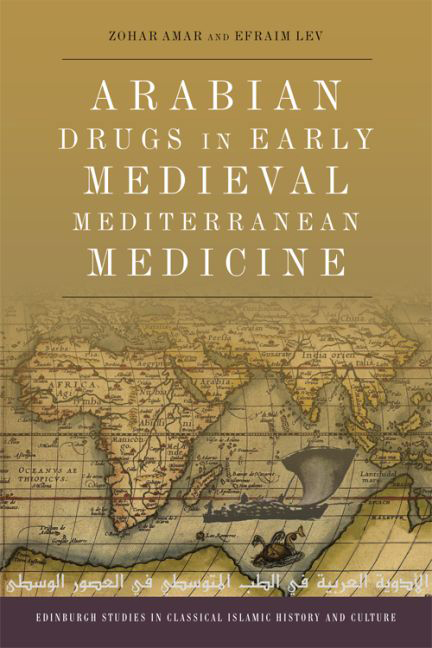Book contents
- Frontmatter
- Contents
- List of Plates
- List of Tables
- Preface
- Map: The Origin of the Main Medieval Arabian Drugs
- 1 Introduction
- 2 Agricultural and Pharmaceutical Innovations: Milestones in Research and Case Studies
- 3 ‘Arabian’ Substances
- 4 Discussion and Conclusions
- Bibliography
- Index of English Names
- Index of Arabic Names
- Index of Scientific Names
1 - Introduction
Published online by Cambridge University Press: 27 April 2017
- Frontmatter
- Contents
- List of Plates
- List of Tables
- Preface
- Map: The Origin of the Main Medieval Arabian Drugs
- 1 Introduction
- 2 Agricultural and Pharmaceutical Innovations: Milestones in Research and Case Studies
- 3 ‘Arabian’ Substances
- 4 Discussion and Conclusions
- Bibliography
- Index of English Names
- Index of Arabic Names
- Index of Scientific Names
Summary
Four generations after the death of the Prophet Mohammad, founding father of Islam, the era of the first Caliphs of the Umayyad dynasty was characterised principally by conquests and the expansion of the Muslim domain. With the rise of the Abbasid dynasty (750), the Muslim world controlled immense territories, from India to Spain and from North Africa to the Arabian Desert. This was the first time since the conquests of Alexander the Great that such a vast territory was ruled by a single power, the Arabs, making them a ‘global village’. Different kingdoms and cultures were unified under the rule of the Arabs, including the two previous great powers, parts of the Byzantium and the Sasanian Empires. From an economic perspective, the entire Fertile Crescent was under Arab control.
This situation created uniquely favourable economic conditions for exchanges of all kinds, since the absence of geo-political barriers allowed for the improved passage of people, merchandise and knowledge from place to place. The double taxation system that had been used at the borders was abolished and even the monetary systems were amalgamated: the dīnār (gold coin) and the dirham (silver coin) were established as legal tender throughout the Muslim empire and were accepted and recognised by the international monetary and economic systems. The Arab rulers’ policy was to retain the previous administrations of Byzantium and Persia in order to prevent economic disruptions or crises. The pinnacle of Arab commerce with the territories of southern and eastern Asia was during the reign of the Abbasids (ninth to tenth centuries), which typically reflects the development of the Hindu–Muslim culture. The term ‘India’ in the ancient sources referred to vast geographical areas, including the islands of the Indian Ocean such as Madagascar, Zanzibar and the Maldives, as well as southern India, Tibet, Sri Lanka (Ceylon), Indonesia and China.
Arab Attitude to Science
The general view emerging from research on the subject is that the Arab conquerors originating from Arabia had either very little theoretical knowledge in the various scientific disciplines of the time or none at all.
- Type
- Chapter
- Information
- Publisher: Edinburgh University PressPrint publication year: 2017



